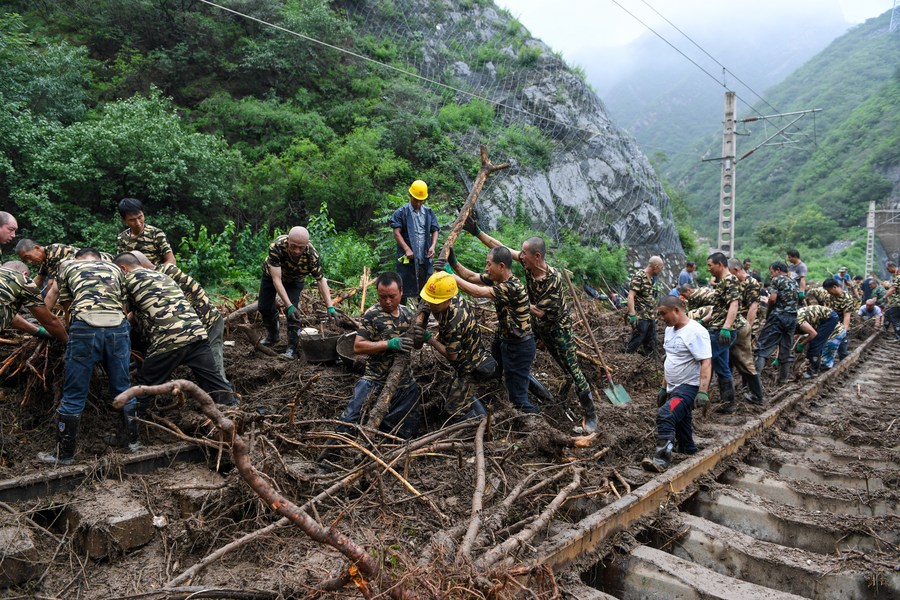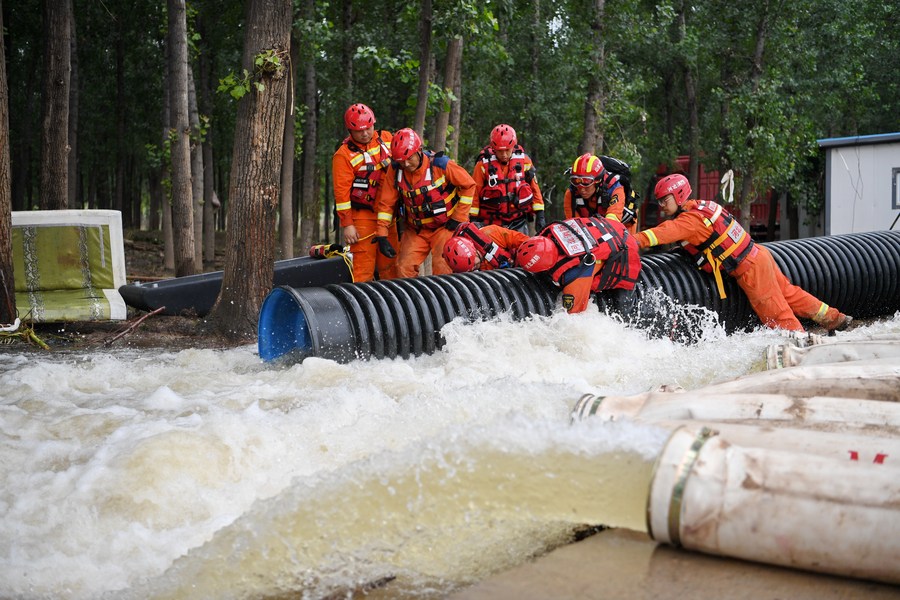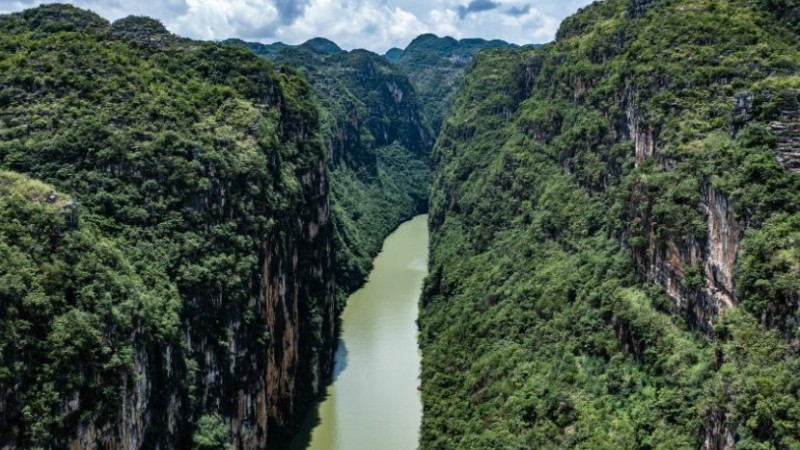Xi leads way in combating Beijing, Hebei floods
BEIJING, Aug. 7 (Xinhua) -- From 8 p.m. on July 29 to 7 a.m. on Aug. 2, Beijing recorded its heaviest rainfall since records began 140 years ago.
The heavy overall rains in the Beijing-Tianjin-Hebei region caused anomalous floods in several districts of Beijing and several localities in north China's Hebei Province in the past few days.
At urgent times, the Communist Party of China (CPC) Central Committee with Xi Jinping at the core kept standing firm in putting the people first and once again provided powerful backing for all those affected.
BEIJING MUST STAND THE TEST
Landing on the southeast Chinese coast on July 28, Typhoon Doksuri had not kept its realm in southern China as many other typhoons that weakened after landing but continued moving northward, bringing rain clouds to northern China.
President Xi closely followed the development of Doksuri, stressing that special precautions should be taken in the Beijing-Tianjin-Hebei region.
Late July and early August are the usual rainy season in China. In early July, Xi, also general secretary of the CPC Central Committee and chairman of the Central Military Commission, asked relevant authorities to enhance coordination, step up monitoring and early warning, and provide targeted guidance over disaster prevention and rescue efforts.
In the face of Doksuri, authorities immediately mobilized, and multiple disaster alerts for mountain torrents, floods and waterlogging were announced.

Railway workers remove fallen trees from railway tracks in Shuiyuzui Village in flood-hit Mentougou District, Beijing, Aug. 1, 2023. (Xinhua/Ju Huanzong)
Typhoon Doksuri brought heavy downpours in north China and resulted in floods and geological disasters.
On July 30, over 2,800 passengers were trapped on the K396, K1178 and Z180 trains in Beijing due to railways cut off by the rainfalls, facing a shortage of food and water and no communication signals.
The situation quickly came to Xi's notice and he immediately made instructions.
"Local authorities and relevant departments must get in touch with the trains and make every effort to arrange rescue and give out food and drugs to ensure the safety of the trapped passengers," Xi said in an instruction.
During the following days of rescue, Xi repeatedly stressed sound logistics guarantees for those temporarily settling where the trains were stuck, urging efforts to transfer trapped passengers to Beijing as soon as possible while ensuring their safety.
On Aug. 3, all the passengers were able to leave the temporary settlement spots.
Amid the rescue, Xi continued to give instructions concerning all those suffering from the natural disaster, stressing efforts to make appropriate arrangements for people affected by the floods and geological disasters, promptly repair damaged infrastructure, including transportation, telecommunications and electricity facilities, and restore order in work and life as soon as possible.
Party members and officials must charge forward, and primary-level Party organizations must play their roles so that the people can feel like they have something to rely upon, said Xi.
"As a modernized metropolis, Beijing must stand the test," he said.

Rescuers carry out drainage operation in Diaowo Township, Zhuozhou, north China's Hebei Province, Aug. 6, 2023. (Xinhua/Mu Yu)
ALL-OUT RESCUE EFFORTS IN HEBEI
When Beijing was drenched, rainstorms also swept half of the counties and city districts in neighboring Hebei. Around 2.2 million people were affected.
Zhuozhou City in Hebei saw 60 percent of its urban areas immersed in water up to 6 meters deep.
Xi was deeply concerned about the disaster situation in Hebei. He learned about the water levels in places including Zhuozhou and instructed the province to mobilize rescuers and resources to promptly evacuate trapped individuals, ensure effective drainage in urban areas, and expedite restoring normal urban operations.
On Aug. 1, Xi demanded all-out search and rescue efforts to find people missing or trapped in floods.
The Organization Department of the CPC Central Committee has allocated 44 million yuan (about 6.16 million U.S. dollars) in funds to assist with flood control and disaster relief work in Beijing, Hebei and Tianjin.
On Aug. 4, the Ministry of Finance and the Ministry of Water Resources allocated 450 million yuan for disaster relief in Beijing, Tianjin and Hebei.
On the same day, the country earmarked an additional 100 million yuan from its central budget to assist in rehabilitation in Tianjin and Hebei.
Local authorities in Hebei mobilized large rescue forces to the flood-hit areas: 4,705 rescue teams consisting of 105,988 members were formed, and emergency departments of various levels exchanged information daily with the teams.
On Xi's instructions, the central government and Beijing also sent support. The Ministry of Housing and Urban-Rural Development and the National Health Commission sent work teams and experts to guide the rescue efforts on site. Beijing Drainage Group dispatched four units of large-scale water pumps, 14 vehicles and 63 technicians to assist with water drainage.

Villagers of Qinglonghu Town have meal at a temporary shelter after being evacuated from flood-hit areas in Fangshan District, Beijing, Aug. 1, 2023. (Xinhua/Zhang Chenlin)
Currently, the ongoing rain has significantly eased, but flood prevention remains a tough challenge.
Xi emphasized that all regions and relevant departments must strengthen monitoring, forecasting and early warning efforts and enhance inspection measures.
On Aug. 4, Xi warned the disaster-affected areas, especially those in mountainous regions, to be vigilant against secondary disasters and not lower their guard.
Authorities in Hebei strived to ensure the safety of flood detention areas and made every effort to minimize losses caused by flood detention.
As of Aug. 4, about 1.6 million people have been evacuated in Hebei, and expressways have all reopened. In the worst-hit Zhuozhou, all 402 villages resumed contact with the outside world, and electricity supplies were restored in 75 urban neighborhoods suffering power cuts due to the flood.
"After the rescue teams cleared the roads, villagers actively took part in relief efforts and transported supplies," said Zhao Feifei, Party chief of Qiyu Township in the city of Baoding, Hebei Province, where a landslide took place.
"We are confident that we can help people restore normal life and production soon," she added.
Photos
Related Stories
Copyright © 2023 People's Daily Online. All Rights Reserved.









